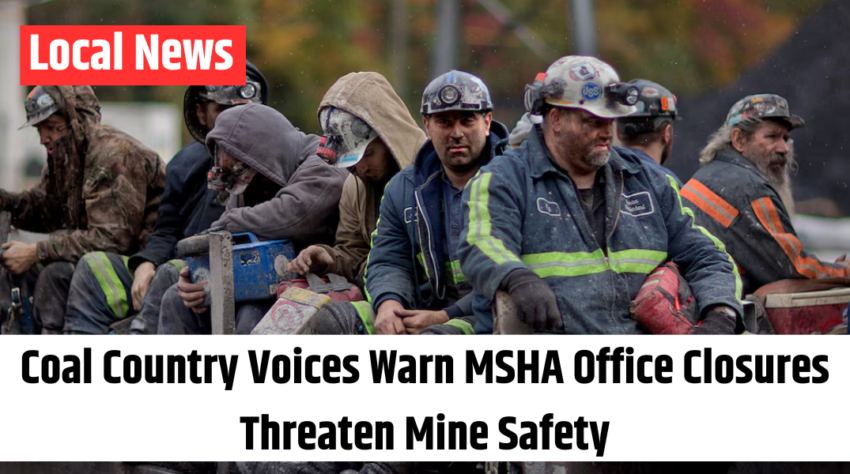CHARLESTON, W.Va. — Stanley “Goose” Stewart, a retired coal miner, is worried about the direction of mine safety in the United States. With the federal government eliminating dozens of mine safety offices, he questions whether it’s even safe to work underground anymore.
The Department of Government Efficiency (DOGE), formed under former President Donald Trump and currently led by Elon Musk, is behind sweeping budget cuts across federal agencies. A major target: the Mine Safety and Health Administration (MSHA), which enforces mining safety regulations. The plan includes shutting down 34 MSHA offices across 19 states — a move Stewart calls “reckless” and a gift to coal operators looking to skirt oversight.
The timing of these proposals is especially poignant: Saturday marks the 15th anniversary of the Upper Big Branch mine explosion, which killed 29 workers — Stewart’s colleagues — in southern West Virginia. He narrowly survived the disaster and never returned to work underground, instead turning to outdoor hobbies and his backyard garden.
West Virginia’s coal mining industry has long been a central political issue. While Hillary Clinton faced criticism in 2016 for acknowledging the transition away from fossil fuels, Donald Trump promised to revive coal — even as job numbers continued to decline. The state has since become a conservative stronghold, but the industry’s safety has remained a point of contention.
Some state lawmakers now say local authorities are capable of regulating mines without federal help. But critics argue that state inspectors often lack independence and are under political pressure, making federal oversight essential.
Tom Clark, a Republican legislator and former MSHA supervisor, previously worked in one of the offices now slated for closure. That location in Summersville, W.Va., now employs only eight inspectors — down from over two dozen a decade ago. Clark said he anticipated the office would eventually close, but believes as long as inspectors are reassigned within mining regions, safety won’t be compromised.
Still, he supports keeping inspector staffing levels stable and ensuring black lung benefits remain well-funded.
Also Read – New WV Law Bans Specific Food Dyes, SNAP Modifications Suggested
“People’s health shouldn’t be something we cut corners on,” Clark said. “We’re saving money — great. Let’s put that into keeping miners healthy.”
Stewart doesn’t share that optimism. He believes shuttering MSHA locations will inevitably compromise safety, and he warns prospective miners to think twice.
“I wouldn’t tell anyone to go into coal right now with Trump and Musk making decisions,” he said.
Stewart, who has long opposed Trump, said he doesn’t understand how so many fellow West Virginians continue to support the former president, despite what he sees as a clear lack of support for working-class communities.
“I just don’t get it. He’s never helped us. I don’t know how people don’t see it,” Stewart said. “I just hope they wake up before it’s too late.”
MSHA, which was established in 1978 as part of the Department of Labor, was created precisely because state agencies were perceived to be too close to the coal industry. Federal inspectors are required to visit every underground mine four times a year and every surface mine twice annually. Their responsibilities include checking for safety hazards, ensuring proper ventilation, inspecting roof supports and dam conditions, and reducing risks from black lung disease.
Jack Spadaro, a veteran mine safety expert, warned that closing offices would increase travel times for inspectors and could lead to more rushed, less comprehensive evaluations.
“It’s a terrible decision made by people who clearly have no clue about the realities of mining safety,” Spadaro said.
The cuts extend beyond MSHA. Hundreds of health professionals working on mining-related occupational safety at the Department of Health and Human Services have also been laid off.
Miners like Robert Cash, 55, a roof bolt operator from Foster, W.Va., say the changes have left workers feeling unsure about their safety.
“There’s a lot of fear out here,” Cash said. “What happens if there’s a disaster and the nearest MSHA office is gone? How fast can help really arrive?”
Stewart recalled being deep inside the Upper Big Branch mine when it exploded on April 5, 2010 — a blast so intense it felt like “a hurricane underground.” As he made his way out, he tried to save others and later covered fallen colleagues with blankets.
Investigations later revealed that a spark from worn equipment ignited coal dust and methane gas, causing the deadly blast.
In the aftermath, MSHA began surprise inspections at high-risk mines, primarily in West Virginia and Kentucky. But under Trump’s second administration, these proactive efforts were halted.
Dr. Carl Werntz, a physician specializing in black lung screenings, said removing federal oversight sends a disturbing message about the value placed on workers’ lives.
“When you remove all these protections, it feels like miners are being treated as expendable,” he said. “That’s deeply troubling.”
